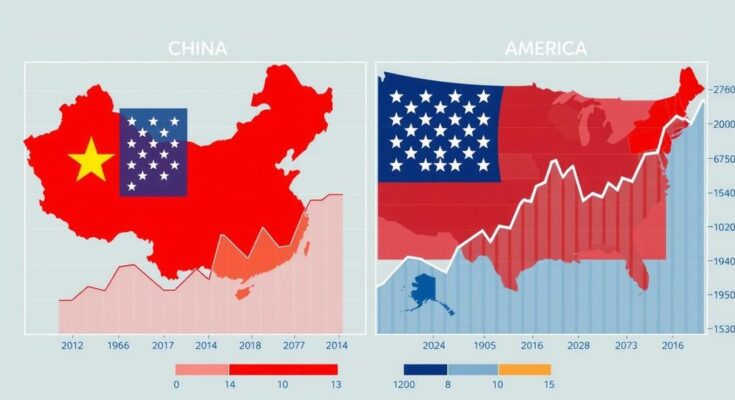China’s economic ascendancy relative to the U.S. challenges traditional metrics like GDP, as geopolitical dynamics, military preparedness, and climate change impact overall national power. The U.S. must adapt to assess its position strategically against China’s growing manufacturing and military capabilities, emphasizing the need for a comprehensive understanding of economic and soft power in this evolving landscape.
The question of how to assess whether China’s economy surpasses that of the United States continues to spark vigorous debate. Some commentators argue that traditional economic indicators such as GDP and manufacturing output are insufficient, given the context of global warming and geopolitical tensions. The viability of U.S.-China relations also hinges on the American administration’s approach towards China’s aggressive ascent. The Chinese government’s significant investments in manufacturing and military capabilities pose a unique challenge to U.S. hegemony, particularly as it continues to rely heavily on fossil fuels while simultaneously promoting green energy initiatives.
The United States, with its focus on maintaining a balance of power, must explore various metrics beyond mere economic outputs, such as technological innovation capacity and military readiness. An understanding of international dynamics and a comprehensive approach to assessing national power must include considerations of soft power and global influence. Historically, the expectation that economic interdependence would foster liberalization in China has proven naïve, as the regime fortified its authoritarian stance amidst expanding global ambitions, especially in the South China Sea.
The ideological rift between the two nations has implications not only for bilateral trade but also for global security. As the geopolitical landscape evolves, nations are urged to think strategically about economic alliances, regional influences, and the overarching threat posed by climate change. The magnitude of resources allocated to defense and technological advancements suggests that both nations continue to position themselves for competition, hinting at a potentially tumultuous international order ahead.
The discussion surrounding China and the United States’ economic rivalry is framed within a broader geopolitical context. Analysts emphasize the significance of not only economic data but also the geopolitical implications of a United States that feels vulnerable to China’s rising influence. Observations on climate change and its economic costs reflect concerns that go beyond immediate GDP comparisons, urging deeper evaluation of national capabilities in a transforming global landscape. As nations grapple with these shifts, the importance of understanding metrics of power, both tangible and intangible, rises, pushing analysts to reconsider conventional approaches to economic assessment.
The complexities of measuring national power in the context of U.S.-China relations necessitate an adaptive framework that goes beyond traditional economic indicators. As both nations navigate a new era of competition influenced by climate change and technological advancements, the metrics of success will require a multifaceted understanding of economic capacity, military readiness, and soft power. Policymakers must embrace a holistic approach to sustain national interests and counterbalance China’s ascendant influence, while acknowledging the intertwined challenges of climate change and defense policy.
Original Source: www.noahpinion.blog




